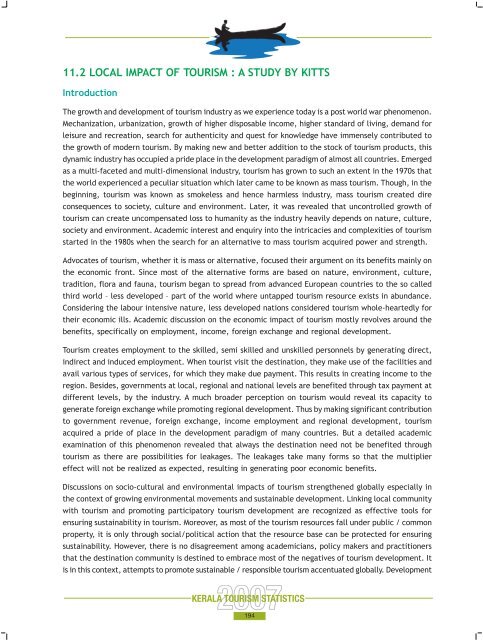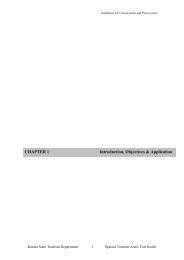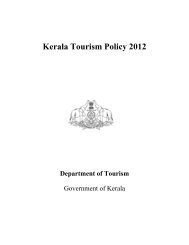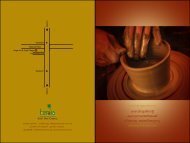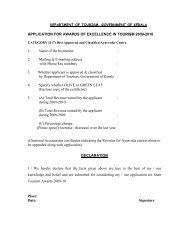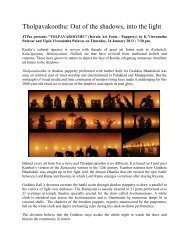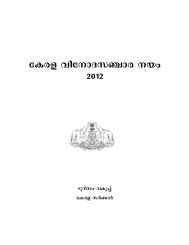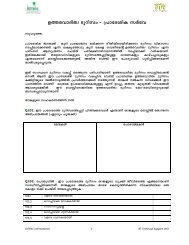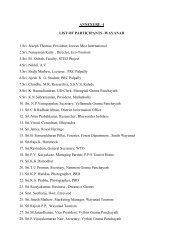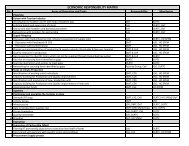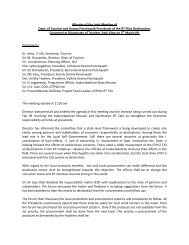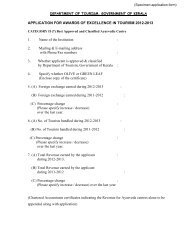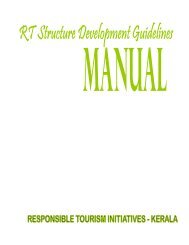Statistics Book 2007.pdf - Kerala Tourism
Statistics Book 2007.pdf - Kerala Tourism
Statistics Book 2007.pdf - Kerala Tourism
You also want an ePaper? Increase the reach of your titles
YUMPU automatically turns print PDFs into web optimized ePapers that Google loves.
11.2 LOCAL IMPACT OF TOURISM : A STUDY BY KITTS<br />
Introduction<br />
The growth and development of tourism industry as we experience today is a post world war phenomenon.<br />
Mechanization, urbanization, growth of higher disposable income, higher standard of living, demand for<br />
leisure and recreation, search for authenticity and quest for knowledge have immensely contributed to<br />
the growth of modern tourism. By making new and better addition to the stock of tourism products, this<br />
dynamic industry has occupied a pride place in the development paradigm of almost all countries. Emerged<br />
as a multi-faceted and multi-dimensional industry, tourism has grown to such an extent in the 1970s that<br />
the world experienced a peculiar situation which later came to be known as mass tourism. Though, in the<br />
beginning, tourism was known as smokeless and hence harmless industry, mass tourism created dire<br />
consequences to society, culture and environment. Later, it was revealed that uncontrolled growth of<br />
tourism can create uncompensated loss to humanity as the industry heavily depends on nature, culture,<br />
society and environment. Academic interest and enquiry into the intricacies and complexities of tourism<br />
started in the 1980s when the search for an alternative to mass tourism acquired power and strength.<br />
Advocates of tourism, whether it is mass or alternative, focused their argument on its benefits mainly on<br />
the economic front. Since most of the alternative forms are based on nature, environment, culture,<br />
tradition, flora and fauna, tourism began to spread from advanced European countries to the so called<br />
third world – less developed – part of the world where untapped tourism resource exists in abundance.<br />
Considering the labour intensive nature, less developed nations considered tourism whole-heartedly for<br />
their economic ills. Academic discussion on the economic impact of tourism mostly revolves around the<br />
benefits, specifically on employment, income, foreign exchange and regional development.<br />
<strong>Tourism</strong> creates employment to the skilled, semi skilled and unskilled personnels by generating direct,<br />
indirect and induced employment. When tourist visit the destination, they make use of the facilities and<br />
avail various types of services, for which they make due payment. This results in creating income to the<br />
region. Besides, governments at local, regional and national levels are benefited through tax payment at<br />
different levels, by the industry. A much broader perception on tourism would reveal its capacity to<br />
generate foreign exchange while promoting regional development. Thus by making significant contribution<br />
to government revenue, foreign exchange, income employment and regional development, tourism<br />
acquired a pride of place in the development paradigm of many countries. But a detailed academic<br />
examination of this phenomenon revealed that always the destination need not be benefited through<br />
tourism as there are possibilities for leakages. The leakages take many forms so that the multiplier<br />
effect will not be realized as expected, resulting in generating poor economic benefits.<br />
Discussions on socio-cultural and environmental impacts of tourism strengthened globally especially in<br />
the context of growing environmental movements and sustainable development. Linking local community<br />
with tourism and promoting participatory tourism development are recognized as effective tools for<br />
ensuring sustainability in tourism. Moreover, as most of the tourism resources fall under public / common<br />
property, it is only through social/political action that the resource base can be protected for ensuring<br />
sustainability. However, there is no disagreement among academicians, policy makers and practitioners<br />
that the destination community is destined to embrace most of the negatives of tourism development. It<br />
is in this context, attempts to promote sustainable / responsible tourism accentuated globally. Development<br />
194


